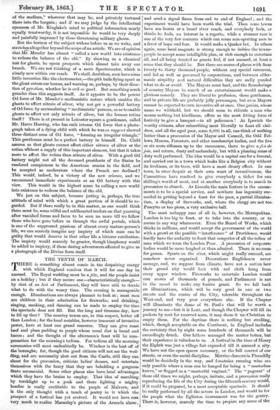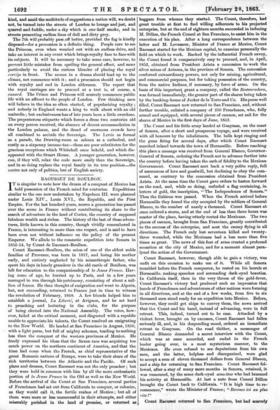THE TENTH OF MARCH.
THERE is something almost comic in the despairing energy with which England resolves that it will for one day be amused. The Royal wedding must be a fete, and the people insist on a holiday ; but if they secure one—characteristically enough— by dint of an Act of Parliament, they will have still to decide what to do with the weary time. The evening is manageable enough. Illuminations are always pleasant to look at ; most men are children in their admiration for fireworks; and drinking, singing, smoking, and dancing can be made to employ the time the spectacle does not fill. But the long and tiresome day, how to fill up that? The country towns are, in this respect, better off than London ; for the local notables, however innocent of inventive power, have at least one grand resource. They can give roast beef and plum pudding to people whose usual diet is bread and bacon ; and the thought of the afternoon's feast will be com- pensation for the morning's tedium. For tedious all the morning ceremonies will most undoubtedly be. Windsor is the best off of the boroughs; for, though the good citizens will not see the wed- ding, and are necessarily shut out from the Castle, still they can shout for the procession, criticize ladies' dresses, and entertain themselves with the fancy that they are beholding a gorgeous State ceremonial. Some other places also have local advantages which they have the brains to employ. That idea of marching by torchlight up to a peak and there lighting a mighty bonfire is really creditable to the people of Malvern, and is the only thought with a touch of poetry in it which the prospect of a festival has yet evolved. It would not have cost very much to realize Macaulay's picture of the Armada alarm, and send a signal flame from end to end of England ; and the experiment would have been worth the trial. Then some towns have sea fronts or a broad river reach, and everybody feels, or thinks he feels, an interest in a regatta, while a steamer race is one of the very few contests which can rouse non-sporting men to a fever of hope and fear. It would make a Quaker bet. In others again, some local magnate is strong enough to indtiee the towns- people to accept some intelligible plan, or rich enough to entertain all, and all being treated as guests feel, if not amused, at least a sense that they should be. But there are scores of places with from twenty to thirty thousand people, without any special resources, and led as well as governed by corporations, and between alder- manic stupidity and natural difficulties they are sadly puzzled what to do or avoid. The Mayors must lead, and the flounderings of country Mayors in search of an entertainment would make a glorious comedy. They are liberal to profusion, these gentlemen, and in private life are probably jolly personages, but even Mayors cannot be expected to turn inventive all at once. One genius, whose name we withhold, lest we should seem to ridicule a man who means nothing but kindliness, offers as the most fitting form of festivity to give a banquet—to all policemen ! At Ipswich the worthy citizens, after subscribing most liberally to feast all chil- dren, and all the aged poor, some 6,000 in all, can think of nothing better than a procession of the Mayor and Council, the Odd Fel- lows, Masons, Foresters, and other nondescript bodies, and the five or six score riflemen up to the racecourse, there to give a feu de joie, and return, dusty and melancholy, but with a pleasing sense of duty well performed. The idea would be a capital one for a funeral, and carried out in a town which looks like a Belgian city without its liveliness, or its trees, will have a most dreary effect. In one town, in utter despair at their own want of inventiveness, the Committees have resolved to give everybody a ticket for one shilling's worth of meat, and at another everybody is to march in procession to church. At Lincoln the main feature in the amuse- ments is to be a special service, and nowhere has ingenuity suc- ceeded in getting beyond a feast for the poor, a partial illumina- tion, a display of fireworks, and, where the clergy are not too,- Puseyite or too pious, a very exclusive ball.
The most unhappy case of all is, however, the Metropolitan. London is too big to feast, or to take into the country, or to amuse in any way whatsoever. Even the Board of Works, which thinks in millions, and would accept the government of the world with a growl at the possible " interference " of Providence, would hardly have the audacity to feast that congeries of all the tribes of man which we term the London Poor. A procession of corporate bodies would be more laughed at than admired. There is no room for games. Sports on the river, which might really succeed, are somehow never organized. Decorations Englishmen never manage, and, we suppose from climate, have not a notion how their grand city would look with red cloth hung from every upper window. Fireworks to entertain London would cost scores of thousands of pounds, and Parliament is not in the mood to make any festive grant. So we fall back tan illuminations, which will be very good in one or two streets and the centre of the City, tolerable throughout the West-end, and very poor everywhere else. If the Chapter will illuminate the dome of St. Paul's that will be worth a journey to see—but it is Lent, and though the Chapter will fill its pockets by rent for reserved seats, it may deem it un-Christian to empty them. For the daytime there is nothing but strolling, which, though acceptable on the Continent, in England includes the certainty that by night some hundreds- of thousands will be exceedingly drunk. Our fathers managed the matter better, but their experience is valueless to us. A festival in the time of Henry the Eighth was just a village fair expanded till it amused a city. We have not the open spaces necessary, or the full control of our streets, or even the social discipline. Morrice-dancers in Piccadilly would be decidedly in the way, and fountains running wine are only possible where a man can be hanged for being a " masterless knave," or flogged as a " masterful vagrant." The " pageant" of those old times we might, perhaps, imitate, and a procession really reproducing the life of the City during the fifteenth century would, if it could be prepared, be a most acceptable spectacle. It should be really performed by all the actors in London, and would be for the people what the Eglinton tournament was for the gentry. There is, however, scarcely the time to prepare any scene of the
kind, and amid the multitude of suggestions a nation will, we doubt not, be turned into the streets of London to lounge and jest, and quarrel and fuddle, under a sky which is one-half smoke, and in streets presenting endless lines of dull and dirty grey.
The 7th will probably pass .off better, provided the fog is kindly disposed—for a procession is a definite thing. People care to see the Princess, even when wearied out with an endless drive, and take an interest in any event which brings royalty face to face with its subjects. It will be necessary to take some care, however, to prevent little mistakes from spoiling the general effect, and more particularly to avoid the curious blunder of placing the royal cortege in front. The scenes in a drama should lead up to the climax, not commence with it ; and a procession should not begin with royalty and end in London aldermen. The report that the royal carriages are to proceed at a trot is, of course, a canard. The Prince and Princess will scarcely commence public life with an affront to the people of London. Few thinking men will believe in the idea so often started, of popularizing royalty ; and nobody in England wants a king to walk about with an old umbrella ; but exclusiveness has of late years been a little overdone. The preposterous etiquette which forces a dress two centuries old on every person received, the absence of decent accommodation in the London palaces, and the dread of enormous crowds have all combined to seclude the Sovereign. The Levee as formal as a parade, the Drawing-room as solemn as a cathedral, and costly as a sixpenny income-tax—these are poor substitutes for the gracious receptions which Whitehall once beheld, and which dis- appeared with the Stuart House. A younger generation, however, can, if they will, relax the code more easily than the Sovereign, and in so doing replace the royal family in its true position—the centre not only of politics, but of English society.































 Previous page
Previous page